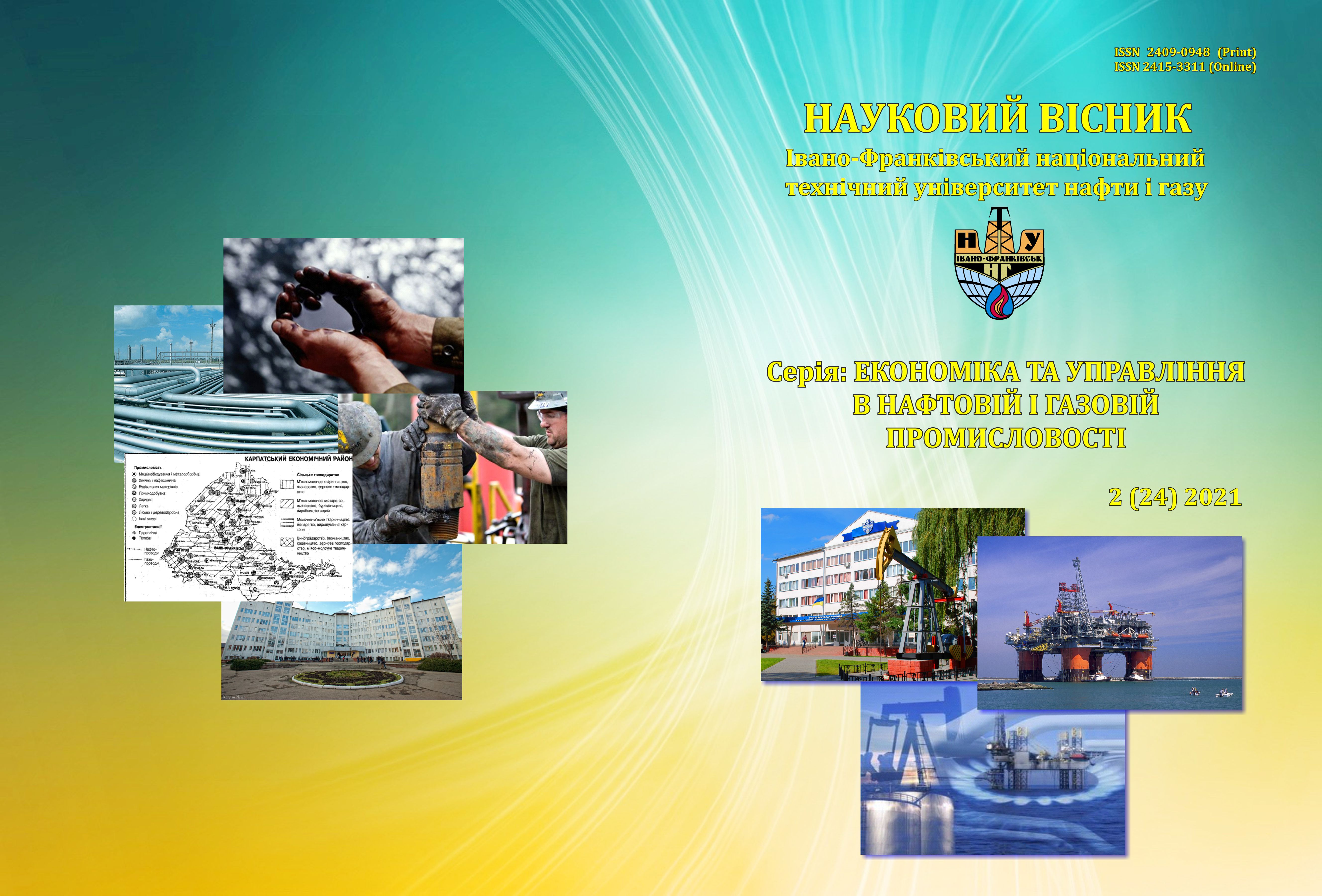FUNDAMENTALIZATION OF EDUCATION IN THE CONTEXT OF FORMATION OF THE KNOWLEDGE SOCIETY AND SOCIAL SECURITY
DOI:
https://doi.org/10.31471/2409-0948-2021-2(24)-140-148Keywords:
criteria, educational space, educational environment, bricolage, social safety, fundamentalization, professional training.Abstract
The article examines the role of fundamental education in ensuring the development of the economy on an innovative basis and in achieving social security. The content of the fundamentalization of education has been investigated. At the same time, both theoretical and practical prerequisites for its achievement are indicated. The main ways of achieving fundamental education are determined, and its main components are analyzed, namely: motivational, cognitive, activity, etc.
Accordingly, it is proved that the fundamentalization of knowledge accelerates the formation of an innovative economy and a knowledge society, which are modern models of socio-economic development. An assessment of the current situation regarding the quality of education, which is now provided by the educational system of Ukraine, is given and a conclusion is made about its insufficiently high level. In this regard, the need to fill the educational process with an innovative essence is emphasized, which includes both the introduction of the latest electronic digital technologies and innovative educational and pedagogical approaches. On the one hand, the article also substantiates the provision that social safety, on the other hand, is a consequence of the development of education, and on the other - it contributes to the latter. In this context, the article provides the criteria and characteristics of a safe educational environment, the need for the formation of which is also noted in the National Strategy for the Development of Education in Ukraine. It is emphasized that the main condition for maintaining social safety is successful economic development. An important place in the article is occupied by the substantiation of the directions in which the educational sphere should develop. Among these areas, the active introduction of social and pedagogical partnership stands out, which is an effective form of interaction between all participants in the educational process. All this is designed to contribute to the formation of an innovative economy and a knowledge society, and the achievement of social safety.
References
Гуцуляк Л.І. Соціально-освітнє середовище в педагогічному процесі школи. Молодий вчений. 2017. № 5(45) С. 304-306.
Ставнича Н.І. (2021). Соціальна безпека України в контексті забезпечення сталого розвитку дис. Phd за спец. економіка. Івано-Франківськ. 205 с.
Затверджені стандарти вищої освіти. URL: https://mon.gov.ua/ua/osvita/visha-osvita/naukovo-metodichna-rada-ministerstva-osviti-i-nauki-ukrayini/zatverdzheni-standarti-vishoyi-osviti
Гаращук О.В., Куценко В.І. Якісна освіта – інструментарій сталого розвитку (питання теорії та практики). Київ: ДУ ІЕПСР НАН України, 2019. 144 с.
Мосийчук Т., Крапива И. Контекстность высшего образования как фактор безопасности социально-профессиональных отношений. Социология: теория, методы, маркетинг. 2016. № 2. С. 133-140.
Якушина М.С. Образовательная среда и образовательное пространство как понятия современной педагогической науки. Человек и образование. 2013. № 2. С. 60-69.
Кінаш І., Куценко В., Євтушенко Г. Інноваційно-освітня парадигма формування соціальної безпеки – передумова сталого розвитку Економіка природокористування і сталий розвиток. 2020. № 8(27). С. 103-110.
Потапова Н. В. Особливості забезпечення геймізації в освітньому процесі закладів вищої педагогічної освіти. Науковий часопис НПУ імені М. П. Драгоманова. №7. 2019. С.210-213
Закон України «Про освіту» URL: https://zakon.rada.gov.ua/laws/show/2145-19#Text
References
Hutsulyak L.I. (2017). Sotsialʹno-osvitnye seredovyshche v pedahohichnomu protsesi shkoly. Molodyy vchenyy. A young scientist. 7, 36-39 [in Ukraine].
Stavny`cha N.I. (2021). Social`na bezpeka Ukrayiny` v konteksti zabezpechennya stalogo rozvy`tku dy`s. Phd za specz. ekonomika. Ivano-Frankivs`k. 205 s.
Zatverdzheni standarty` vy`shhoyi osvity`. URL: https://mon.gov.ua/ua/osvita/visha-osvita/naukovo-metodichna-rada-ministerstva-osviti-i-nauki-ukrayini/zatverdzheni-standarti-vishoyi-osviti
Garashhuk O.V., Kucenko V.I. Yakisna osvita – instrumentarij stalogo rozvy`tku (py`tannya teoriyi ta prakty`ky`). Ky`yiv: DU IEPSR NAN Ukrayiny`, 2019. 144 s.
Petrov A.V., Gurbatov S.N., Bednyy B.I., Borisova I.I. (2010). O pokazatelyakh deyatel'nosti i kriteriyakh akkreditatsii vysshikh uchebnykh zavedeniy. Vyssheye obrazovaniye segodnya. Higher education today. 7, 17-22 [in Russian].
Mosiychuk T., Krapiva I. (2016). Kontekstnost' vysshego obrazovaniya kak faktor bezopasnosti sotsial'no-professional'nykh otnosheniy. Sotsiologiya: teoriya, metody, marketing. Sociology: theory, methods, marketing. 2, 133-140 [in Russian].
Yakushina M.S. (2013). Obrazovatel'naya sreda i obrazovatel'noye prostranstvo kak ponyatiya sovremennoy pedagogicheskoy nauki. Chelovek i obrazovaniye. Human and education. 2, 60-69 [in Russian].
Kinash I., Kucenko V., Yevtushenko G. Innovacijno-osvitnya parady`gma formuvannya social`noyi bezpeky` – peredumova stalogo rozvy`tku Ekonomika pry`rodokory`stuvannya i staly`j rozvy`tok. 2020. # 8(27). S. 103-110.
Potapova N. V. Osobly`vosti zabezpechennya gejmizaciyi v osvitn`omu procesi zakladiv vy`shhoyi pedagogichnoyi osvity`. Naukovy`j chasopy`s NPU imeni M. P. Dragomanova. #7. 2019. S.210-213
Zakon Ukrayiny` «Pro osvitu» URL: https://zakon.rada.gov.ua/laws/show/2145-19#Text
Downloads
Published
How to Cite
Issue
Section
License
Copyright and Licensing Terms
Copyright Statement
The authors who publish in the journal accept the following conditions:
- The authors retain the copyright and grant the journal the right of first publication, licensed with Creative CommonsCC BY-NC-SA , which permits other people to remix, transform, and build upon the material and use the material for non-commercial purposes, give appropriate credit and distribute the contributions under the same license as the original.
- The authors can conclude additional agreements on the non-exclusive distribution of the journal’s published version of the work (for example, publication of the work in electronic repositories) with an acknowledgment of its initial publication in this journal.
- The authors can upload the published articles on the Internet (for example, in electronic repositories or on web-sites), as it will stimulate fruitful scholarly discussions and increase the citation rates of the published articles.


1.png)


1.png)





